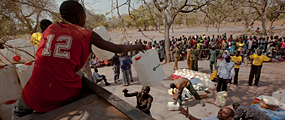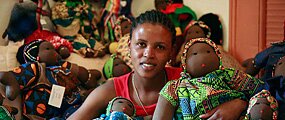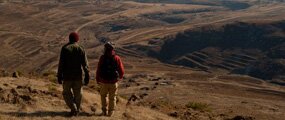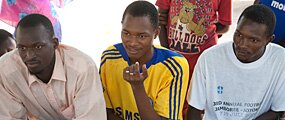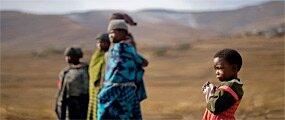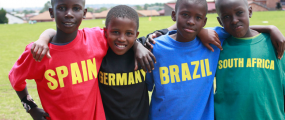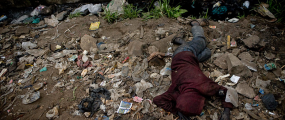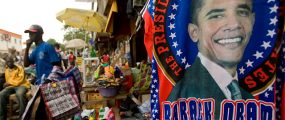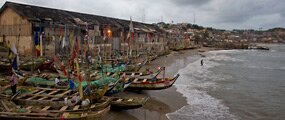Imitators of Christ
 After two weeks without a bath, these Georgia boys smell.
After two weeks without a bath, these Georgia boys smell.
Flecks of grass speckle John’s unruly brown beard. Therron’s blonde hair is matted with dirt and sweat, which thankfully he hides under a toboggan hat. And Drew’s army coat is stained with a month’s worth of dirt.
They have an outhouse, but nowhere to bathe. They wear layers of clothes and just change around the layers every couple of days. Most of the time it’s too cold to shower, anyway. So once every two weeks they catch a ride to their supervisor’s house to bathe and shave.
Even though it’s July, it’s wintertime in the mountains of Lesotho, a small country surrounded by South Africa.
For two months, over school break, these guys have chosen to live in a concrete two-room building with no insulation. The only source of heat is a small coal stove. They sleep in thermal sleeping bags with wool blankets piled high, trying to keep warm during the numerous blizzards.
Sitting on the side of a rocky mountain, our feet dangling over a drop off, I ask them why they are here. Why are they going weeks without a shower? Why are they putting up with the frigid weather?
“I’m having this opportunity to live Christ [among] people that are lost and are dying — I mean literally people who are dying,” says 19-year-old Drew Hooks.
In the surrounding villages more than 65 percent of the population is infected with HIV/AIDS. Most will be dead within the next 18 months. That’s how hard life is here.
John Younker, 22, sobs as he talks about the death he has seen.
 “Christ died for everyone,” John says. “He didn’t die [just] for the middle class. He didn’t die [just] for the Religious Right. He didn’t die [just] for America. He [also] died for the children that are going to die here.”
“Christ died for everyone,” John says. “He didn’t die [just] for the middle class. He didn’t die [just] for the Religious Right. He didn’t die [just] for America. He [also] died for the children that are going to die here.”
The guys know that malnutrition is a huge factor in these rapid deaths, and to counter it, they help build keyhole gardens for the sick. A keyhole garden is built up in a crescent shape, using rocks to the height needed so the patient doesn’t have to bend or lean. Multiple plantings through the year provide enough to sustain the patient and family.
As they share about the joy of meeting and living among the Basotho people, I wonder why we’ve hiked up this mountain.
The shepherd boys, the outcasts, live up here, they explain. Someone always has to be with the sheep. These boys rarely get social interaction and only occasionally see their own families. They don’t get to go to school and are not sought after for marriage. Clothed in a blanket and galoshes — and pants if they’re lucky — they survive on food they can find or kill.
The shepherd boys have huge smiles that show off glistening white teeth. They give a complicated handshake I have yet to master, greeting the American guys in the Sesotho language.
The guys hike up here to spend time with the young boys — even spending the night in tents next to the shepherds’ small huts.
“We do not have an agenda to talk about Christ in a formulaic manner, but just to sit there and shake a shepherd’s hand, and just to spend time with each other and enjoy each other’s company,” says 21-year-old Therron Smith.
 As we hike down the mountain and walk through the village, the people come to greet the guys with huge smiles and waves.
As we hike down the mountain and walk through the village, the people come to greet the guys with huge smiles and waves.
They throw out the few words they know in Sesotho. Though not much is actually communicated, I can see the people have accepted these guys and genuinely like them.
I ask them how they managed to make friends without really knowing the language.
They point to a nearby cornfield they helped harvest. A little ways beyond they show me where they play soccer with the school kids. Next is a neighbor’s house, where they often spend time talking about the Bible and the life of Christ, using the help of a local pastor who speaks English.
“We’re just trying to be imitators of Christ, showing two things — grace and love,” says John. “We have just been really passionate about … living [among] the Basotho here in Lesotho.”
Their intention has been “to live in the village and try to be like the people, and to live life with them, go to the well with them, go to the store with them, go to the fields with them, to do their life,” he says.
They hope the Basotho will see the Savior through them as they become imitators of Christ.
As we continue our walk through town they stop in front of a dirty, concrete building with a tin roof. On the days when there is nothing to do in the fields, they come here, to the local pool hall, to shoot pool with the few teenage guys who haven’t died from AIDS.
From the way these guys share about the hardships they never thought they could endure, but did, it’s evident they consider this a summer — make that a winter — well spent.
“To be an imitator of Christ … anything that comes out of that is just whatever God will gain glory from,” says John. “And if we can focus on trying to be an imitator of Christ, then everything else will just fall into place.”
_________
To find out how you can be on mission in Africa, visit:
www.thetask.org (missions opportunities for students)
www.imb.org (missions opportunities for individuals, families and churches)
www.thelastletter.org/lifestyle/ (social justice projects)
www.gobgr.org (human needs projects)
Follow Us Online!





